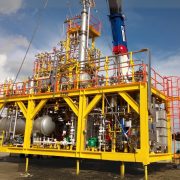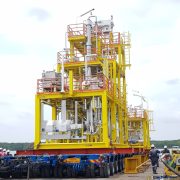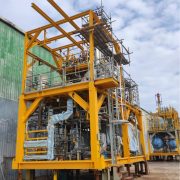GAS TREATMENT
Natural Gas Treatment in the EPCC Industry
Treating natural gas involves a series of processes aimed at purifying and conditioning raw natural gas extracted from reservoirs before it can be transported, distributed, or utilised. We design and build custom packages to suit your specific needs. Below you will find our gas treatment packages tailored to optimise efficiency, safety, and reliability throughout your gas treatment process.
OUR GAS SOLUTIONS

Gas Dehydration
Dehydration ensures that the gas meets pipeline specifications and prevents damage to downstream equipment. Common methods of gas dehydration include absorption, adsorption, and condensation.

MEG Regeneration
Monoethylene Glycol is used as a liquid desiccant to remove water vapor from natural gas streams. This process is essential for maintaining the efficiency and cost-effectiveness of gas dehydration systems:

Amine Sweetening
Amine selectively reacts with the acidic gases, forming stable compounds that are then separated from the treated gas. This improves the quality and marketability of the natural gas product.

CO₂ Removal
CO₂ removal involves processes such as absorption, adsorption, and membrane separation to selectively separate carbon dioxide from natural gas streams. The choice depends on factors like gas composition and purity.

Fuel Gas Conditioning
Conditioning processes typically involve removing impurities such as water, solids, sulfur compounds, and other contaminants to ensure the gas meets the specific quality requirements for combustion and equipment protection.

Dew Point Control
The system typically involves cooling the gas below its dew point using refrigeration or other methods, then reheating it to a specified temperature to prevent condensation during transmission or processing.
PROJECT EXPERIENCE


















